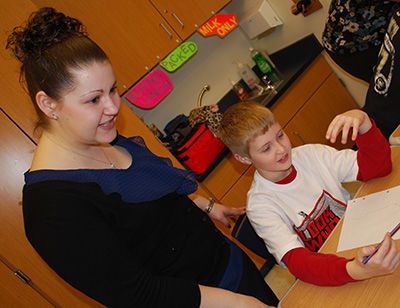The Professional Development Partnership is a collaborative relationship between Penn State's Elementary and Early Childhood Education program and local area elementary schools. This partnership represents a commitment to teacher education, teacher inquiry, and continuous professional development of preservice (interns) and in-service teachers, University faculty, and administrators to maximize elementary and middle-school student learning.
Our Mission Statement
Penn State Altoona is committed to the growth and development of children and adults. The collaboration between the college and local elementary schools is grounded in the common belief that the care and concern for students must serve as the foundation to continuously develop learning and inquiry at every level.
Benefits of the Partnership
- Experience an intensive, field-based alternative program
- Become a long-term member of the school learning community
- Experience an entire school year from the first to the last day, allowing for a more developed understanding of students, curriculum, and schools
- Opportunities to participate in a thoughtful inquiry into teaching about issues that are important to individual teachers and schools
- Sustained professional development during the internship
Members of the Professional Development Partnership
The partnership community is made up of school and University personnel. We are committed to the notion of a learning community and the importance of everyone having a voice and role. Members include the interns, classroom teachers, field experience supervisors, methods instructors, the University program coordinator, and school and University administrators. The partnership community meets monthly for professional development programs and partnership meetings.
What does the Partnership route look like?
Students who choose to participate in the partnership spend the first three years (six semesters) completing traditional program coursework. The final two semesters are blended into an intensive, on-site teaching experience. Students complete thirty credits of coursework while teaching in an elementary classroom for one full school calendar year. While it takes planning, students can complete the partnership program in the same amount of time as the traditional program.
Frequently Asked Questions
How is this different from a traditional experience?
Although the programs can be completed in the same amount of time, students in the traditional program spend two days a week in the schools during the fall semester. Students who participate in the partnership spend more time in the school, engage in an inquiry project, and, as long-term participants in the school learning community, have additional opportunities for professional development beyond course seminars.
What is meant by “the entire school year” experience?
Participants in the partnership follow the school district calendar and begin in August approximately a week before the first day of school and continue until the last day of the school calendar in June. They observe school holidays and vacations rather than the University calendar.
What happens after I graduate?
Students in both programs graduate during the May commencement ceremony. However, participants in the partnership will return to the school on the following Monday and complete the school year.
Who do I tell if I want to participate in the Professional Development Partnership?
If you think you are interested in participating in the partnership, speak to your adviser as soon as you begin considering this alternative option. You should plan your pre-major coursework to accommodate the increased time in the schools during your final year. Potential participants should also contact the Elementary and Early Childhood Education Program Coordinator to express their interest, although admission into the alternative program is not guaranteed.
What courses do I take during the internship year?
During the final year, all participants take thirty credits of University coursework. These credits include the Discipline Inquiry Block (SCIED 458, MTHED 420, SSED 430W, CI 495B) and the student teaching internship credits (CI 495 D, CI 495F). Additionally, all participants are required to take CI 405 as one of their elective 400-level education courses.



